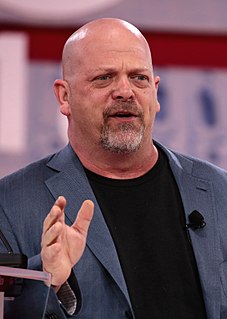A Quote by Rick Harrison
If the economy is bad, I might be bringing a lot of things in, but it's difficult to sell, and the opposite when the economy is good.
Related Quotes
I tend to go with things people need. Obviously with the barbershop, people will need haircuts regardless of the economy. In a down economy, I choose businesses that don't require a lot of start-up cash or a cash injection on a regular basis. They might need some initially, but not often after. Rental of properties is a good business in a down economy as people struggle with mortgages.
When you take away the subsistence economy, then your farm population is seriously exposed to the vagaries of the larger economy. As it used to be, the subsistence economy carried people through the hard times, and what you might call the housewife's economy of cream and eggs often held these farms and their families together.
In general, presidents and congressmen have very limited power to do good for the economy and awesome power to do bad. The best good thing that politicians can do for the economy is to stop doing bad. In part, this can be achieved through reducing taxes and economic regulation, and staying out of our lives.
Failure's inevitable. It happens all the time in a complex economy. And how did the economy produce all these amazing things that we have around us, computers and cell phones and so on? Well, the process was trial and error. There were a bunch of ideas, and the good ones grew and prospered, and the bad ones were pretty ruthlessly weeded out.
Today it's fashionable to talk about the New Economy, or the Information Economy, or the Knowledge Economy. But when I think about the imperatives of this market, I view today's economy as the Value Economy. Adding value has become more than just a sound business principle; it is both the common denominator and the competitive edge.
I think the reason that the Trump economic agenda is beneficial is, he is doing the right things. He wants to see growth, he wants to see to lower taxes, he wants to see this cash pile sitting outside the US return to the US. All of these things I think will be good for the US economy, and as I've said, if the US economy grows, the global economy benefits hugely.


































